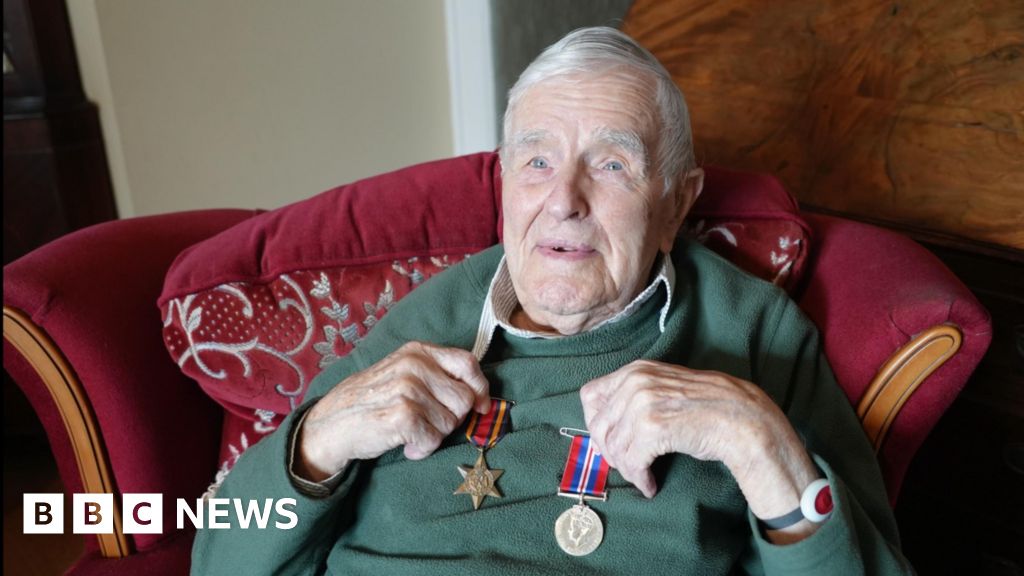Politics
British WWII Veteran Reflects on Hiroshima’s Atomic Horror

Duncan Hilling, a 99-year-old World War II veteran from Saundersfoot, Pembrokeshire, recently shared his harrowing memories of witnessing the aftermath of the atomic bombings in Japan. As one of the first British soldiers to arrive in Hiroshima after the bombs were dropped, Hilling described the devastation he encountered in 1945, highlighting the lasting impact of nuclear warfare. His reflections come as he received a letter of thanks from Eluned Morgan, the First Minister of Wales, commemorating the 80th anniversary of Victory over Japan.
On August 6, 1945, the American B-29 bomber, the Enola Gay, dropped the atomic bomb known as Little Boy on Hiroshima. This marked the first use of nuclear weapons in conflict, resulting in the immediate destruction of approximately five square miles (13 square kilometers) and contributing to an estimated 140,000 deaths among the city’s 350,000 residents. Just three days later, another atomic bomb was dropped on Nagasaki, which led to at least 74,000 additional casualties.
Unforgettable Memories of Destruction
Hilling, who initially joined the RAF in April 1944 before transferring to the Army, recalled his arrival in Hiroshima. He vividly described the scene: “We went to Hiroshima and saw the horror of the atomic bomb. Blind people were being led around, and there were still dead bodies lying in the streets.” He visited schools that had been converted into makeshift hospitals, witnessing firsthand the profound suffering inflicted by the bomb. “We saw people who were totally blind, and their hands and skin were burnt,” he recalled. “To me, it was horrible. The newspapers described an atomic bomb, but they don’t convey the people or what they looked like.” Hilling expressed a heartfelt hope that such devastation would never be repeated.
During his time in Japan, Hilling observed the widespread destruction of homes, noting that “90% of the houses were wooden, and they were all burnt.” He and his fellow soldiers engaged with locals, who described the moment of the bomb’s explosion as a horrific flash that left them with lasting trauma. Many survivors recalled losing their sight and not remembering anything beyond that moment.
The Long-Term Impact of Radiation
In the years following the bombings, the effects of nuclear radiation continued to claim lives. Hilling mentioned that several members of his regiment, who had taken “souvenirs” from the bomb sites, later succumbed to cancer. “I didn’t take any souvenirs, but nobody ever mentioned that radiation was a problem,” he explained. “Three boys from the regiment who were with me at the time took some things away from the site. They all died of cancer in their 30s and 40s.”
In the wake of Japan’s surrender on August 14, 1945, the UK, US, and Australia celebrated with national holidays. Millions participated in parades and street parties to mark the end of the war. Hilling celebrated in India before heading to Japan, where he recalled the excitement of singing “Cwm Rhondda,” saying, “It must have been different from any other regiment; I can’t think of anyone else who celebrated by singing hymns.”
Following his experiences in Japan, Hilling was deployed to Malaya during the Malayan Emergency, a conflict arising from a communist revolt against British rule. He described the unsettling atmosphere of walking through the jungle, always aware of potential danger.
In her address to Hilling, First Minister Eluned Morgan emphasized the significance of his experiences. The letter of thanks acknowledged “the sacrifice, the contribution, and service that Duncan made,” and highlighted that he represents a generation of individuals who can no longer share their stories. She remarked, “It is important that we remind the children of today of the cost of war and why it’s important to listen to witnesses like Duncan and know why we try to avoid it at all costs.”
As the world reflects on the events of 1945, Hilling’s memories serve as a powerful reminder of the human cost of war and the enduring legacy of nuclear weapons.
-

 Entertainment2 months ago
Entertainment2 months agoIconic 90s TV Show House Hits Market for £1.1 Million
-

 Lifestyle4 months ago
Lifestyle4 months agoMilk Bank Urges Mothers to Donate for Premature Babies’ Health
-

 Sports3 months ago
Sports3 months agoAlessia Russo Signs Long-Term Deal with Arsenal Ahead of WSL Season
-

 Lifestyle4 months ago
Lifestyle4 months agoShoppers Flock to Discounted Neck Pillow on Amazon for Travel Comfort
-

 Politics4 months ago
Politics4 months agoMuseums Body Critiques EHRC Proposals on Gender Facilities
-

 Business4 months ago
Business4 months agoTrump Visits Europe: Business, Politics, or Leisure?
-

 Lifestyle4 months ago
Lifestyle4 months agoJapanese Teen Sorato Shimizu Breaks U18 100m Record in 10 Seconds
-

 Politics4 months ago
Politics4 months agoCouple Shares Inspiring Love Story Defying Height Stereotypes
-

 World4 months ago
World4 months agoAnglian Water Raises Concerns Over Proposed AI Data Centre
-

 Sports4 months ago
Sports4 months agoBournemouth Dominates Everton with 3-0 Victory in Premier League Summer Series
-

 World4 months ago
World4 months agoWreckage of Missing Russian Passenger Plane Discovered in Flames
-

 Lifestyle4 months ago
Lifestyle4 months agoShoppers Rave About Roman’s £42 Midi Dress, Calling It ‘Elegant’









